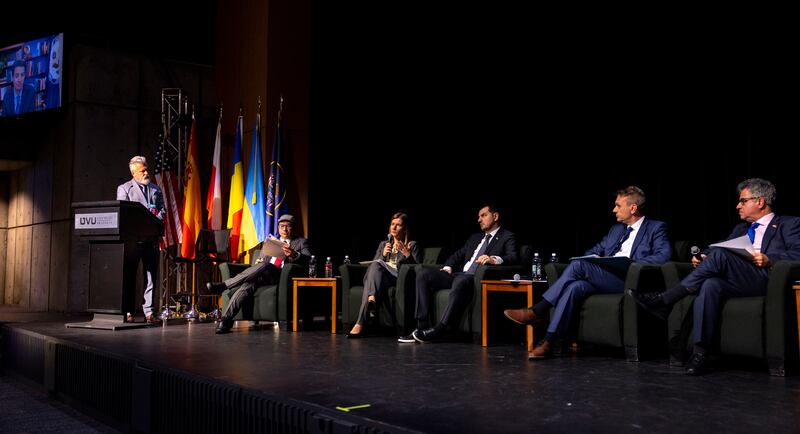The war in Ukraine may not be top of mind any more to many Americans, the way it was a year ago when the Russian advance was fresh, but you don’t have to look far for reminders, even in Utah.
I found Maryna Storrs just outside the Ragan Theater at Utah Valley University, where she had just sung as part of a choir performing Ukrainian songs before a diplomatic conference titled, “Ukraine: One year later …”
Inside, people with impressive titles were talking about lessons learned and their concerns about the future of the war. Outside, Storrs put a human face on it all.
A resident of Lehi who has been in Utah 25 years (“I was an exchange student here, and I liked it so much I came back here to college,” she said), she told me about her 78-year-old mother, 74-year-old aunt and disabled brother, all of whom live in Sumy, Ukraine.
If you Google the place, you come up with headlines like, “Russia shells Sumy 177 times,” or “Ukraine Russia conflict: Sumy under siege.” You’ll also find this, from The Guardian: “How Sumy’s residents kept Russian forces out of their city.”
Although located only 30 kilometers from the Russian border, Sumy is what Storrs said Ukrainians refer to as a “hero city.” The Guardian puts it this way:
“The efforts of Sumy self-defense forces and ordinary residents inside and outside the city contributed to the disruption of the Russian supply lines from the Russian border to Kyiv. Their efforts helped prevent Russian forces from successfully surrounding the capital and seizing control of the country’s command center.”

Still free from Russia’s clutches, Sumy is a great place for a nation to be proud of, but you probably wouldn’t want your mother, aunt and brother living there.
Inside the conference hall, the honorable consul of Poland, Dobroslawa Siemianowska, explained the numbers. More than 10 million Ukrainians have crossed the border since the war began. Of Poland’s 38 million people, 12% now house some Ukrainian people, whether in their own houses, apartments or summer homes.
“Imagine every single homeless person in the United States finding a home in your homes, and now triple that number,” Siemianowska told the audience.
Poland has coped with this humanitarian challenge with an enviable attitude of charity and compassion. First, people opened their hearts and homes, and then the government followed with laws allowing the refugees full legal status and access to social services, including medical care.
UVU has been punching far beyond its weight lately, hosting conferences of international importance. Last June, it hosted a China Challenge Summit that attracted international media, U.S. Ambassador to China Nicholas Burns, former ambassador to China and Russia Jon Huntsman Jr., and a host of other China experts.
In October, the school hosted a three-day United Nations conference that attracted worldwide attention and included the presentations of 75 scholarly papers.
This week’s conference was no less ambitious, featuring consul generals from Ukraine, Poland, Romania and Spain, a professor from the University of Texas at Austin and Ryan Guirlinger of the U.S. Department of State, who attended via video.
They expressed opinions on many topics, including whether international sanctions have worked. Americans may be skeptical, but Guirlinger gave a resounding yes.
“The goal is not the collapse of the Russian economy,” he said. Many casual observers expected too much from sanctions. “That’s not going to happen and that’s not our objective.”
Instead, the idea was to disrupt Russia’s ability to effectively wage war.
“We’ve seen the effects on the battlefield, that Russia is unfortunately still launching many things on Ukraine but it’s not able to buy the credible elements it needs for many of these (high tech military) systems,” he said. As a result, Russian soldiers have taken to cannibalizing washing machines and other products obtained from central Asia, which is hardly ideal for modern warfare.
In addition, Russia’s economy contracted last year, another sign that sanctions have taken hold, he said.
Siemianowska, of Poland, put it this way: “Is the fact that a Russian girl cannot buy an iPhone in Russia any more, is that going to change the world? Well, no.” However, if more and more Russians discover they have lost access to Western goods, it represents “little drops that can actually start a corrosion in the society.”
She added, “If I’m naive thinking that, well, I’m hopeful.”
For her part, Storrs is not naive about what her mother, aunt and brother are enduring. She talks to them every week, which she said is comforting. But she knows all about the bombs.
She has sponsored other families and friends who have left Ukraine for the United States. But her own family is staying put.
“They don’t want to leave,” she said. “They’re older, so they say, ‘Hey, if the bomb hits us, the bomb hits us,’ which is sad for me to hear.”


